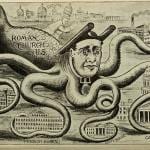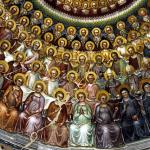
Protestant apologist Jason Engwer (words in blue below) recently wrote:
It’s common to allege that the twenty-seven-book New Testament canon we have today doesn’t first appear in the historical record until around the middle of the fourth century, in Athanasius. But it probably was advocated in multiple locations prior to that time, including in Origen more than a century earlier. (10-14-20)
He links to an 11-year-old paper of his where he fleshes this out:
The earliest extant source I’m aware of who advocates that twenty-seven-book canon is Origen, more than a century before Athanasius. . . . Near the end of his life, Origen commented:
our Lord, whose advent was typified by the son of Nun [Joshua], when He came, sent His Apostles as priests bearing well-wrought trumpets. Matthew first sounded the priestly trumpet in his Gospel. Mark also, Luke and John, each gave forth a strain on their priestly trumpets. Peter moreover sounds loudly on the twofold trumpet of his Epistles; and also James and Jude. Still the number is incomplete, and John gives forth the trumpet-sound in his Epistles and Apocalypse; and Luke while describing the Acts of the Apostles. Lastly however came he who said: ‘I think that God has set forth us Apostles last of all,’ and thundering on the fourteen trumpets of his Epistles, threw down even to the ground the walls of Jericho, that is to say all the instruments of idolatry and the doctrines of philosophers. (Homilies On Joshua, 7:1 . . .)
This passage is controversial. The scholarly reactions to it are diverse. Bruce Metzger argues that the passage is genuine and seems to refer to our twenty-seven-book canon . . ., which is the position I hold. . . .
I conclude, then, that Origen is the earliest extant source to advocate the twenty-seven-book New Testament canon. But even if it would be argued that he held a twenty-five-book or twenty-six-book canon instead, the similarity to our canon would be highly significant. (5-4-09)
What Jason curiously neglects to note is that a deficient canon is not only a list with less books than the 27 New Testament books all Christians now accept; it also includes lists with more books than the 27. This was the beauty of St. Athanasius in 367 (the very thing Jason is trying to dispute). He not only listed the present 27 books, but did not hold that any other books were also scriptural.
Jason argues that Origen (c. 184 – c. 253) was the first to present all 27 and no other additional ones (114 years before Athanasius undoubtedly did so), since Jason says he was “the earliest extant source to advocate the twenty-seven-book New Testament canon.”
But Jason did what so many Protestants who argue from the Church fathers unfortunately do: he selectively presented patristic evidence that backs him up and ignored other evidence that does not. This won’t do (needless to say). Jason neglected to tell his readers which non-canonical books Origen also thought were Scripture: the Epistle of Barnabas, the Didache, and Shepherd of Hermas. So he could hardly have accepted a 27-book canon if he accepted these, now, could he?
Origen often referred to the Shepherd of Hermas, and late in his life (around 244-246), he referred to it as “a work which seems to me very useful, and, as I believe, divinely inspired” (Comm. in Rom. 10.31). He appeared to accept the canonicity of the Epistle of Barnabas in his Contra Celsus: one of the three times he cited it:
[H]e seems, in order to bring an accusation against Christianity, to believe the Gospel accounts only where he pleases, and to express his disbelief of them, in order that he may not be forced to admit the manifestations of Divinity related in these same books; whereas one who sees the spirit of truth by which the writers are influenced, ought, from their narration of things of inferior importance, to believe also the account of divine things. Now in the general Epistle of Barnabas, from which perhaps Celsus took the statement that the apostles were notoriously wicked men, it is recorded that
Jesus selected His own apostles, as persons who were more guilty of sin than all other evildoers.And in the Gospel according to Luke, Peter says to Jesus,Depart from me, O Lord, for I am a sinful man.(I, 63; also written late in his life, in 248)
Many scholars also think that Origen regarded the Didache as inspired and canonical. Lee Martin McDonald, in his book, The Formation of the Biblical Canon: Volume 2: The New Testament: Its Authority and Canonicity (Bloomsbury Publishing, 2017), stated:
Origen also refers to the Epistle of Barnabas, Shepherd of Hermas, and Didache, possibly or apparently acknowledging them as Scripture. . . . If one claims that Origen acknowledged James and Jude as canon because he made use of them, then the same could also be said for Epistle of Barnabas, Shepherd of Hermas, and the Didache. (p. 83)
In a related article written on 30 May 2009, Jason shows that he is aware of two of these three books: “The Shepherd Of Hermas and The Epistle Of Barnabas weren’t as popular as is often suggested.” Nor does he mention Origen at all in the article. “Out of sight, out of mind” is, I guess, Jason’s philosophy, when he runs across anomalies that don’t fit into his preconceived notions. He discusses all three of these books in another paper on the New Testament canon (dated 5-7-09), but again never informs his readers that Origen thought they were canonical Scripture, even though he is mentioned three times. Instead, he reiterates:
Athanasius’ twenty-seven-book New Testament was held by some of his contemporaries and by some before his time. Origen is the earliest source I’m aware of who advocates the twenty-seven-book canon in the records extant to us. Though Athanasius’ Festal Letter 39 from the middle of the fourth century is often cited as the first reference to the twenty-seven-book canon, the evidence suggests that it was advocated at least more than a century earlier.
It’s not at all certain that Origen even accepted all 27 New Testament books (later decreed as such in the late 4th and early 5th centuries by the Catholic Church, along with the Old Testament, including the Deuterocanon). He never cited 2 Peter, and Eusebius records him as stating:
And Peter, on whom the Church of Christ is built, ‘against which the gates of hell shall not prevail’ (Matt. 16:18), has left one acknowledged Epistle; possibly also a second, but this is doubtful. (Church History, 6.25.8)
He also never cited 2 or 3 John, and wrote:
He has left also an epistle of very few lines; perhaps also a second and third; but not all consider them genuine, . . . (Ibid., 6.25.10)
On the other hand Origen did cite the Gospel of Peter (Comm. in Matt. 10.17) and the Gospel of the Hebrews (e.g., Comm. in John 2.12; Comm. in Matt. 16.12), sometimes adding a phrase like “if any one receives it” (Hom. in Jeremiah 15.4; Comm. in Matt. 15.14). He cited the Preaching of Peter twice (Comm. in John 13.17; De Princ. praef. 8), the Acts of Paul twice (De Principiis, 12.3; Comm. in John 20.12), and 1 Clement four times.
It’s far worse, from the minority anti-Catholic position within Protestantism, for one to hold that a non-biblical book is inspired, than for Catholics to hold to authoritative tradition, which is not inspired.
For much of the above data, I drew from Glenn Davis’ superb overview, “The Development of the Canon of the New Testament”: Origen.
I think Jason’s readers are entitled to know these relevant facts, in light of his claims that Origen got the 27 New Testament books right.
As we would expect, while there was a broad consensus as to which books belonged in the New Testament in the first four centuries, still there was enough disagreement, and the inclusion of non-canonical books, to make a Church proclamation necessary. The books were not self-attesting or “perspicuous” enough for the Bible itself to accomplish the task of determining the canon.
***
Related Reading
The New Testament Canon & Historical Processes [1996]
Dialogue on Doctrinal Development (Papacy & NT Canon) (vs. Jason Engwer) [2-26-02]
Development of the Biblical Canon: Protestant Difficulties [2-26-02 and 3-19-02, abridged with slight revisions and additions on 7-19-18]
Are All Bible Books Self-Evidently Inspired? [6-19-06]
Are All the Biblical Books Self-Evidently Canonical? [6-22-06]
25 Brief Arguments on the Biblical Canon & Protestantism [2009]
Catholic Development of Doctrine: A Defense (vs. Jason Engwer; Emphasis on the Canon of the Bible & Church Infallibility) (+ Pt. II / Pt. III / Pt. IV) [1-15-10]
Biblical Canon vs. Protestant Sola Scriptura [6-5-10]
Church Authority & the Canon (vs. Calvin #59) [2012]
Conundrum! Scripture Alone Cannot Establish the Biblical Canon [National Catholic Register, 5-16-17]
The New Testament Canon is a “Late” Doctrine [National Catholic Register, 1-22-18]
Is Inspiration Immediately Evident in Every Biblical Book? [National Catholic Register, 7-28-18]
Vs. James White #10: Arbitrary Tradition Re the Canon [11-14-19]
***
Photo credit: Imaginative portrayal of Origen from Les Vrais Portraits Et Vies Des Hommes Illustres by André Thévet (1516-1590) [public domain / Wikimedia Commons]
***













